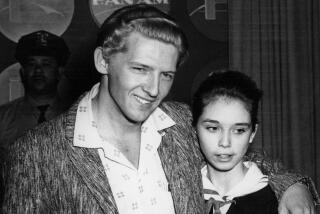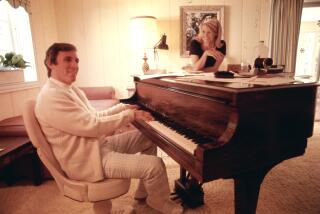The Dregs Come Back for Reunion Tour That’s Fun
The Dregs got their name in a facetious moment, but by the time the all-instrumental cult band broke up six years ago, guitarist and composer Steve Morse felt as if he really had tasted the bitter residue at the bottom of the music business barrel.
“There were just enormous business problems. It (seemed) like there was a conspiracy to break the band,” Morse said. “It got to be too much. I had to quit. It came down to an honest feeling, me saying: ‘This isn’t fun anymore, and it certainly isn’t rewarding.’ ”
Now the Dregs are back, but this time around they are free from the financial rip-offs and record company demands for control that Morse said dogged the band. The point on this Dregs reunion tour, which stops at the Coach House in San Juan Capistrano on Monday and Tuesday, is to have fun playing the old songs for old fans, Morse said, rather than to establish a new career.
“Everybody just had two weeks of free time, and we filled it with something that’s extremely challenging and enjoyable,” Morse said. “Why should you say no to that kind of opportunity?”
The Dregs’ appeal was based on instrumental virtuosity in a progressive jazz-rock vein initially popularized in the ‘70s by such acts as the Mahavishnu Orchestra and Jeff Beck. Originally called the Dixie Dregs, the Atlanta-based band was also influenced by the jazzier inflections of Southern groups such as the Allman Brothers Band and Sea Level.
That reputation for virtuosity is what brought the Dregs back together for their informal fling. It started when some old Dregs fans at Ensoniq, a Pennsylvania-based manufacturer of electronic keyboard instruments, thought that an advertising campaign featuring a band of musician’s musicians such as the Dregs would help its sales.
Morse said the Dregs had been looking for a reason to play together again, so they took up Ensoniq’s proposal to make a compact disc--available through Ensoniq and musical instrument dealers--featuring new versions of two of their old songs, plus an interview about the recording process.
Morse, keyboardist T. Lavitz, bassist Andy West and drummer Rod Morgenstein regrouped in April at the studio that Morse had built for himself on his farm in Georgia. “We really enjoyed it. I said, ‘Why don’t we get together and play some smoky bars like we used to?’ ” West couldn’t break away from his job with a computer company, so bassist Dave LaRue has filled in on the Dregs’ brief series of summer dates.
Since the Dregs broke up, Morse has concentrated on changing career channels. For a while he tried hay farming. Then he launched his own band, which included Morgenstein on drums. In 1986, he joined Kansas. Last year, his career took off--literally--when he went to work as a pilot for an Atlanta-based commuter airline.
Morse, who has been flying airplanes for 13 years, figured he could hold down a regular job as a pilot while moonlighting on recording projects with Kansas. But scheduling conflicts arose and Bob Ezrin, producer of Kansas’ upcoming album, insisted that he decide whether he wanted to play the guitar or fly prop-jets.
“It was one of the toughest choices of my life,” Morse said, but he decided to quit the airline early this year and devote himself to the music full time. Between Kansas’ album, the Dregs reunion and a solo album that he plans to release in January, Morse may no longer be flying, but he hardly is standing still.
A VIEW FROM THE TOP: The question put to Thomas R. Kendrick, the Orange County Performing Arts Center’s president and chief operating officer, was whether talk of booking rock music at the Center would automatically send up a red flag. “Not to me,” Kendrick said in an interview published in Sunday’s Calendar. “But perhaps to board members.”
Henry T. Segerstrom, the Center’s chief executive officer and board chairman, said Tuesday that rock doesn’t send up a red flag for him.
“I don’t think it presents any problem whatsoever,” Segerstrom said, as long as the acts have a track record of playing upscale halls without mishaps or damage. “I would say that Elton John would be fine. Madonna would be fine,” he said.
A concert in January by country singer Johnny Cash is the closest the Center has come to a rock show since Segerstrom Hall opened nearly two years ago. That show was not booked by Center officials, but by an independent promoter who rented the hall.
Kendrick has authority over the Center’s own bookings, Segerstrom said, and “I can’t conceive of a situation where (the board) would not accept his recommendation.”
Segerstrom said he wouldn’t favor a special effort to book a rock act for the sake of proving that rock can work at the Center. “To say that we have to force the scheduling (of other concerts) around a single rock performance seems to be pushing a point for the purpose of making a demonstration,” he said.
If and when rock arrives at the Center, Elton John could be a solid choice but don’t bet on Madonna. Her dossier for concert comportment, which Center officials would be sure to check, includes a black mark from a 1987 appearance at Anaheim Stadium in which she allegedly invited fans to rush the stage. The incident has prompted several lawsuits from concert-goers who claim they were injured in the crush.
Segerstrom, a leading Orange County developer who confesses that rock is “a little out of my field,” said he wasn’t aware of Madonna’s troubles at Anaheim Stadium.
Carl Mitchell, another board member, said he “would not be opposed per se to rock groups,” but “the type that would be most appropriate would be in the pop area, the more mellow-type groups.”
Asked to rate a hypothetical list of acts for their suitability, Mitchell said the Everly Brothers would be “OK,” Stevie Wonder and Hank Williams Jr. would rate a “maybe,” while the Talking Heads and Sting would be “probably a no.” Said Mitchell: “I personally like Sting, and my sons do too, but I would put him in the category of Talking Heads” as too hard-rocking for the Center. Asked about the same hypothetical list of performers, Segerstrom said he would lean toward Stevie Wonder, but pleaded unfamiliarity when it came to the other acts.
NUCLEAR MELTDOWN? Club Postnuclear, the Laguna Beach rock club that opened July 30 with an unorthodox no-alcohol/no-smoking policy, has been going through some growing pains, including the resignation of its booking agent. Malcolm Falk, who also books the Palomino in North Hollywood and the Belly Up Tavern in Solana Beach, said he resigned earlier this month over differences in philosophy with owner Max Nee, whose previous background has been in real estate investment.
Falk said Postnuclear either needs to serve alcohol so it can have the cash flow to book major bands, or it needs to become a teen-oriented venue focusing on young, up-and-coming acts that can be booked cheaply. Postnuclear’s stated aim is to draw primarily an 18-and-over audience while booking major bands.
“They’re very nice people, and the club is potentially a great club, but the business doesn’t make sense,” Falk said. He said he resigned partly in protest of Nee’s cancellation of a show that Falk had booked for Aug. 11 with guitarist Albert Lee and the Biff Baby All Stars.
Lee is a respected and extremely active session guitarist, and his bassist, Sterling Ball, runs the Ernie Ball Co., a leading manufacturer of guitar strings. Falk said a successful show that left Lee and Ball impressed with the club would have resulted in favorable word of mouth being telegraphed along the two musicians’ extensive network of contacts. “It would have been great for the future in the alliances we could have gained,” Falk said.
More to Read
The biggest entertainment stories
Get our big stories about Hollywood, film, television, music, arts, culture and more right in your inbox as soon as they publish.
You may occasionally receive promotional content from the Los Angeles Times.







